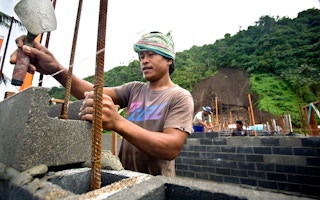Over the years, Claire Anterea has waved goodbye to numerous friends and family members as they left the Pacific island nation of Kiribati for jobs in regional powerhouse Australia. She had never considered joining them - until now.
Australia will introduce a permanent residency option for Pacific islanders this year, and has also expanded its short-term labour programme - part of the country’s wider efforts to counter China’s growing influence in the region.
Anterea, 43, a climate activist, said the residency offer had led her to consider a permanent move to Australia as she grows increasingly concerned about her country’s long-term future due to rising seas caused by climate change.
“If our people are affected by sea level rise, we don’t have a place to go,” Anterea told Context by phone from her home in Kiribati’s capital, Tarawa.
“This life for me is good, but what about my daughter? For the sake of my child, I want to migrate and to get a job and contribute to a new home,” she added.
Sea level rise could cover more than half of the low-lying Tarawa atoll’s land by 2100, threatening more than 60 per cent of its population, according to the Intergovernmental Panel on Climate Change (IPCC).
While such forecasts raise the spectre of a wave of climate migration in decades to come, for the meantime policymakers in island nations fear Australia’s efforts to court migrant workers could fuel a “brain drain” of skilled people.
Pacific workers can earn up to four times as much in Australia or New Zealand, said Richard Curtain, a leading Pacific labour mobility researcher.
“
This is quite urgent. We see Australia as the leader in our Pacific region so they should focus on improving the pathways for our people in climate-threatened communities.
Akka Rimon, researcher, Australian National University
That makes the offer of even temporary work an attractive prospect in countries like Fiji where youth unemployment surged to 37 per cent in 2020, according to the Asian Development Bank (ADB).
Skilled professionals
The mass departure of skilled professionals, especially digital workers, is a worrying trend, Fiji’s Deputy Prime Minister Manoa Kamikamica said earlier this month.
“This is a matter of great concern to our nation, as the loss of highly skilled professionals in the IT sector can have serious implications for our economic growth and competitiveness,” he told a conference.
Samoa’s industry and labour minister, Leatinu’u Faumuinā Wayne So’oialo, voiced similar concerns in November.
Almost a quarter of Fiji’s population lived abroad in 2019, while about 12 per cent of Samoa’s workforce participated in labour schemes in Australia or New Zealand last year, according to an ADB report in December.










